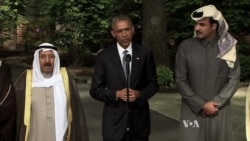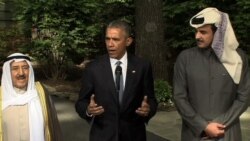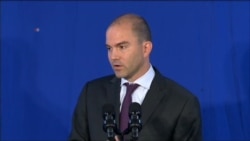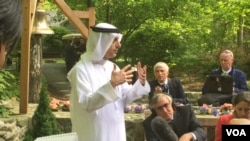President Barack Obama said Thursday that the United States had an "ironclad" commitment to the security of its Gulf allies and would consider using military force if they were threatened.
Obama hosted a summit of leaders and senior ministers from the six-nation Gulf Cooperation Council at the Camp David presidential retreat north of Washington. They included Saudi Arabia's crown prince and deputy crown prince, the emirs of Kuwait and Qatar and senior officials from Bahrain, Oman and the United Arab Emirates.
The president said after the meeting that he had been “very explicit” during the talks that the United States would stand by its GCC partners “against external attack,” and would consider "using the means at our collective disposal, including the potential use of military force."
He said the region is going thorough "extraordinary changes" and "great challenges."
The Gulf leaders came to the summit looking for reassurances from the president that the U.S. is fully committed to their security. What they received fell short of the formal defense agreement that some Gulf countries wanted, but they got the message they wanted at a time when they feel threatened by Iran’s role in the region and by the rise of extremist groups.
Obama said the U.S. would increase its effort to help the Gulf states meet the full range of threats. This would include more military exercises and assistance in developing missile defense and rapid response capabilities.
The Gulf states have been concerned that a nuclear agreement between their archrival Iran and major world powers would ease Western sanctions and turn Iran into a more aggressive regional power.
A number of the Gulf leaders “did express the concern that with additional resources, through the reduction in sanctions, that was it possible that Iran would siphon off a lot of these resources into more destabilizing activities,” Obama said.
But the president said he was glad that the Gulf leaders were now giving their broad support for a comprehensive and verifiable deal to keep Iran from building a nuclear weapon, understanding that this also would be in their interest.
Saudi Arabia's Foreign Minister Adel al-Jubeir said late Thursday that his government would wait and follow the nuclear negotiations witih Iran before judging them.
Obama and the GCC also promised to strengthen the moderate opposition in Syria, back the humanitarian truce in Yemen, and work for a two-state solution in Israel — although the president said the chances of a peace agreement between Israel and the Palestinians appear "distant" right now.
President Obama Hosts Gulf Leaders at Camp David:
U.S. deputy national security adviser Ben Rhodes said GCC officials seemed to have an understanding of the details of the framework of the Iran talks, including the intrusive inspections and transparency measures that will be in place to ensure Tehran abides by the limitations in the deal and is thus prevented from developing nuclear weapons.
“Because we are committed to their security and because we cooperate on the security and stability of the region, it’s important for them to have an understanding of what the nuclear deal is, and of course, we would welcome their determination that a nuclear deal can contribute to the security of the region,” Rhodes said.
U.S. deputy national security adviser Ben Rhodes speaking about the summit:
When asked about any binding agreements with Gulf countries, Rhodes said the United States was not initiating mutual defense treaties with Gulf partners, calling such agreements a “complicated piece of business.”
Instead, he said, the United States will expedite its ability to provide assistance to Gulf countries to build their capacity to deal with “asymmetric threats” related to terrorism, as well as cyber, maritime and border security.
“There will be a clear signal to continue to enhance joint military exercises … helping GCC partners be more interoperable with themselves and with our military. There will be an extensive program coming out of this of cooperation,” Rhodes said.
The administration said it was open to the idea of granting its GCC partners major non-NATO ally status, which would make them eligible for certain kinds of military assistance.
Asked about the potential for a nuclear arms race, Rhodes said none of the Gulf countries present had given indications they would pursue a nuclear program that would raise concerns.
Tehran has said its nuclear program is for peaceful purposes.
Obama and Gulf leaders discussed strategies for Syria later Thursday, with the White House open to evaluating the option of a no-fly zone to help with the Syrian conflict, Rhodes said. However, he said the measure is not seen as a viable way to address fighting in urban areas.
He also said the White House has not independently verified new reports of chemical weapons use in Syria.
Saudi FM addresses media
Addressing members of the press shortly after talks, Saudi Arabia's al-Jubein was quick to emphasize the broad range of topics discussed, opening remarks by saying Thursday's meetings "were not about P5+1 talks and Iran nuclear program."
"[On] Yemen, we have said that we will support military cease-fire subject to Houthis abiding by cease-fire," he said. "We are working to get humanitarian assistance into Yemen and we are hoping that Houthis will abide by terms of cease-fire. On Iran, we were assured that the objective is to deny Iran a nuclear weapon and that all pathways were closed — everybody welcomed this."
Describing an "extremely productive day," he said delegations also discussed "how to deal with counterterrorism, how do we advance; how do we counter Iran’s negative involvement in the region and how do we work together as a group to solve problems in Libya, Yemen, etc. ... This meeting was about strategic relationship between these countries — the reality of the relationship is about common security," he said.
"This was not a meeting about 'we want, you give.' "
Obama administration officials this week dismissed talk of a snub by Saudi Arabia, after Saudi officials said King Salman would not be attending the summit as planned. Of the six GCC countries, only Kuwait and Qatar sent heads of state.
Some material for this report came from Reuters and AP.








